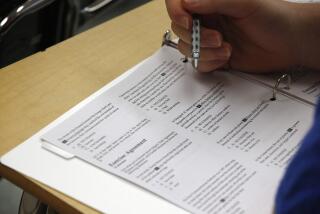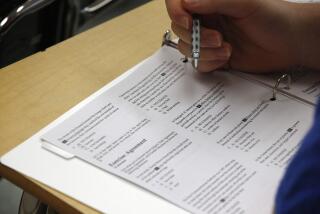Braking Abuse of SAT
- Share via
The Scholastic Aptitude Test has long been a hallmark of meritocracy in U.S. education, affording students regardless of station in life a chance to prove they deserve access to the nation’s best colleges.
The SAT has been battered over the years by charges that its questions played to the white middle class and that scores were easily raised by expensive private coaching. But its reputation as the best evaluation tool available has largely survived. Now, however, the SAT is being tarnished by a growing number of parents and students who have learned to manipulate testing rules to their advantage. As staff writer Kenneth R. Weiss reported in The Times Sunday, the number of students who claim a learning disability to get extra time to complete the SAT has increased by more than 50% in recent years, and the increase is concentrated in enclaves of the rich and savvy.
Granted, much of the rise may be due to recognition among test administrators of the hardships posed by serious learning problems. However, many students are being granted special accommodations on the basis of poorly defined disorders. Most troubling is the disproportion in who gets extra help. Only 1.9% of students nationwide got special SAT accommodations--mostly extra time--but the percentage jumps to nearly 10% at 20 prominent Northeastern private prep schools and a select group of private high schools in Southern California. Elite public schools on both coasts also had above-average rates.
Five years ago the College Board, which owns and supervises administration of the SAT, set up a panel of psychologists and other experts to review requests for extended time from students with no history of disability. But SAT officials should go further and, like American College Testing, which administers an alternative to the SAT, insist on documentation for disabilities diagnosed within a year before taking the test. The College Board, however, can’t prevent abuse on its own. Psychiatrists need to tighten their overly broad and fuzzy classifications of disorders. Psychologists need to recognize a growing conflict of interest in their profession, wherein a psychologist who diagnoses attention deficit disorder more readily than others gets more business as a result.
Schools themselves often grant special accommodations based on questionable evidence because they fear parents’ lawsuits for failing to comply with antidiscrimination laws like the Americans with Disabilities Act, which requires schools to “reasonably accommodate” disabled students. That 1990 law, however, is meant to protect the blind, the paraplegic, the mentally retarded and others with “substantial impairment” to a “major life activity,” and its original intent should be preserved.
Education resources must be distributed fairly--especially when it comes to the SAT, whose worth is built on fairness. Children in the greatest need of assistance should not be competing with parents who have learned to work the system to their own advantage.
More to Read
Sign up for Essential California
The most important California stories and recommendations in your inbox every morning.
You may occasionally receive promotional content from the Los Angeles Times.













